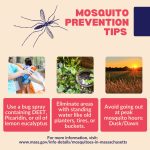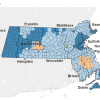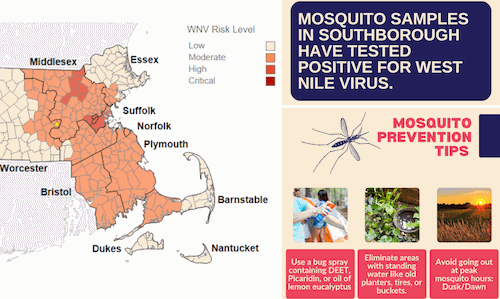Above: An update on the Mosquito-borne illness risk and safety measures for our town and region. (images edited from state website and SFD post)
This week, a woman from Middlesex County tested positive for West Nivel Virus. Earlier this summer, the Southborough Health Department issued a warning about mosquitos tested positive for West Nile Virus in Southborough. Southborough’s “Moderate Risk” status hasn’t changed since I shared the news, but there have been changes in the region.
Since many athletes in youth or high school sports travel to away games, I’m providing readers with an update.
 As of yesterday, Southborough’s direct neighbors are still just at “Moderate Risk” for WNV. But Acton and Newton are among the communities now considered high risk. (I created the map image right highlighting Southborough from the state’s map showing data as of September 2nd.)
As of yesterday, Southborough’s direct neighbors are still just at “Moderate Risk” for WNV. But Acton and Newton are among the communities now considered high risk. (I created the map image right highlighting Southborough from the state’s map showing data as of September 2nd.)
According to the state’s website, the virus can “cause illness ranging from a mild fever to more serious disease like encephalitis or meningitis.” 80% of those infected won’t have symptoms and only 1% suffer “severe illness”. 20% can develop unpleasant symptoms including fever and vomiting. You can find those details here.
 To reduce risk increasing in our town/our yards, residents should take care to remove sources of “standing water” in their yards where mosquitos can breed. Most residents are also encouraged to protect themselves with repellent spray. (See flyer right from Southborough Fire Dept Facebook post.)
To reduce risk increasing in our town/our yards, residents should take care to remove sources of “standing water” in their yards where mosquitos can breed. Most residents are also encouraged to protect themselves with repellent spray. (See flyer right from Southborough Fire Dept Facebook post.)
To protect babies/infants — the the state’s website recommends using mosquito netting on baby carriages and playpens (since repellent shouldn’t be applied to them).
As I shared last month, the Central Mass Mosquito Control Project has already been spraying in town. CMMP’s website states that it is no longer taking spray service requests. But, as of this morning, “Southborough/Westborough” is scheduled to be sprayed on Wednesdays and Thursdays this month. (You can check their website here for future spraying schedules.)
Readers concerned about avoiding your yard being sprayed with pesticides can learn about requesting an exclusion here.
Additional info and advice about West Nile Virus and reducing risk is detailed in the town’s August 6th alert (prior to the risk level rising to moderate):
it is important to take precautions to prevent mosquito bites and mosquito-borne diseases.
WNV is most commonly transmitted to humans by the bite of an infected mosquito. The mosquitoes that carry this virus are common throughout the state and are found in urban as well as more rural areas. While WNV can infect people of all ages, people over the age of 50 are at higher risk of severe infection.
By taking a few common precautions, people can help to protect themselves and their loved ones: Avoid Mosquito Bites
- Apply Insect Repellent when you go outdoors. Use a repellent with DEET (N, N-diethyl-m-toluamide), permethrin, picaridin (KBR 3023), IR3535 or oil of lemon eucalyptus [p-methane 3, 8-diol (PMD)] according to the instructions on the product label. DEET products should not be used on infants under two months of age and should be used in concentrations of 30% or less on older children. Oil of lemon eucalyptus should not be used on children under three years of age. Permethrin products are intended for use on items such as clothing, shoes, bed nets and camping gear and should not be applied to skin.
- Clothing Can Help reduce mosquito bites. Although it may be difficult to do when it’s hot, wearing long- sleeves, long pants and socks outdoors will help keep mosquitoes away from your skin.
- Be Aware of Peak Mosquito Hours – The hours from dusk to dawn are peak biting times for many mosquitoes. When risk is increased, consider rescheduling outdoor activities that occur during evening or early morning. If you are outdoors at any time and notice mosquitoes around you, take steps to avoid being bitten by moving indoors, covering up and/or wearing repellant.
Mosquito-Proof Your Home
- Drain Standing Water – Many mosquitoes lay their eggs in standing water. Limit the number of places around your home for mosquitoes to breed by either draining or getting rid of items that hold water. Check rain gutters and drains. Empty any unused flowerpots and wading pools and change water in birdbaths frequently.
- Install or Repair Screens – Some mosquitoes like to come indoors. Keep them outside by having tightly- fitting screens on all your windows and doors.
Information about WNV and reports of current and historical WNV virus activity in Massachusetts can be found on the MDPH website at: www.mass.gov/dph/mosquito.
For additional information, please contact the Southborough Health Department at: 508-481-3013.
 The risk for contracting EEE remains “low” in our region. You still have to travel as far as Easton or Ware to reach a “Moderate” risk for that virus, and there are still no “High” risk communities in the state. (My map right was created earlier this summer based on the state’s as of August 8th, but their map hasn’t changed as of this morning.)
The risk for contracting EEE remains “low” in our region. You still have to travel as far as Easton or Ware to reach a “Moderate” risk for that virus, and there are still no “High” risk communities in the state. (My map right was created earlier this summer based on the state’s as of August 8th, but their map hasn’t changed as of this morning.)


